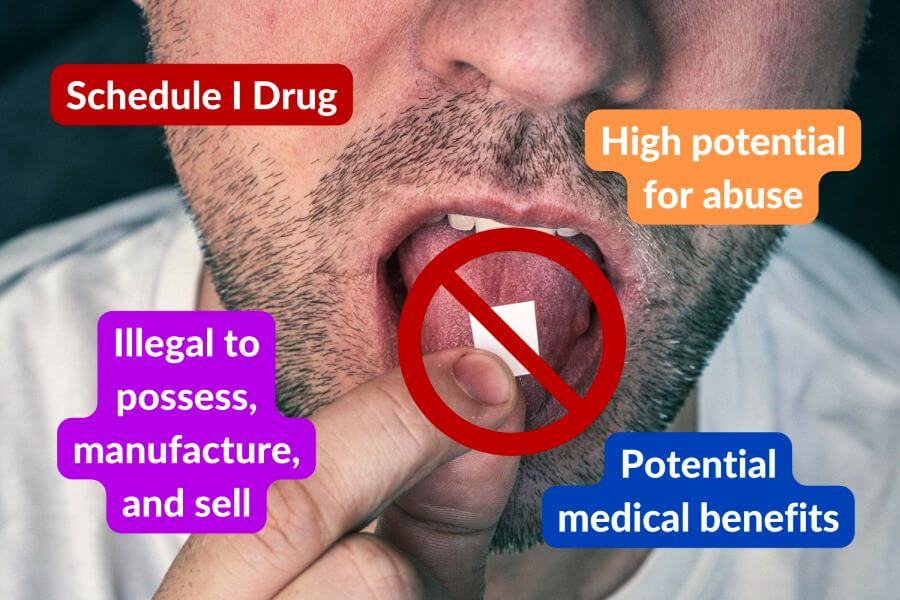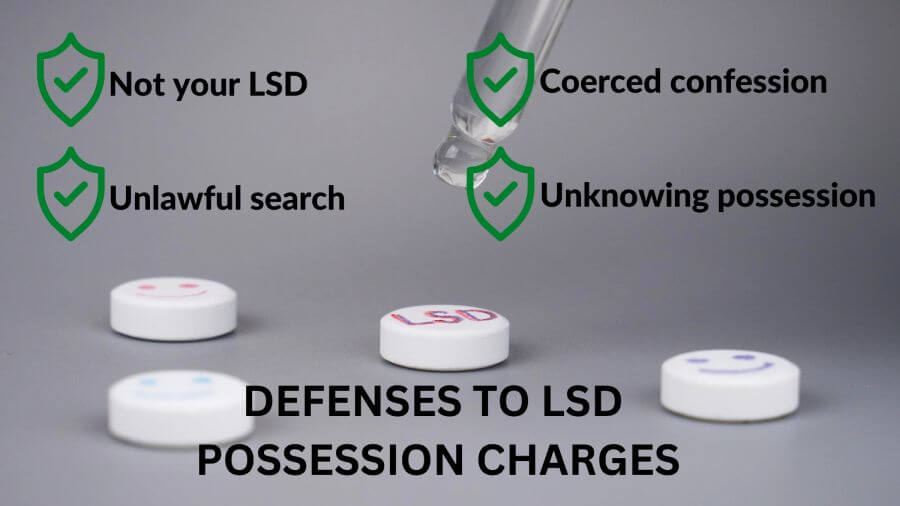What are the penalties for LSD possession? What defenses can be used in court? In this blog post, we’ll explore the answers to these questions and more. So, if you’re curious about LSD laws, keep reading!
TL;DR
- LSD is listed as a Schedule I drug under the Controlled Substances Act (CSA). This means that its possession, manufacture and sale is illegal and punishable by fines, prison time, or probation ⚠️
- Exact penalties vary from state to state, and in some cases, a defense attorney can help reduce the sentence 🛡️
About LSD Laws
Lysergic acid diethylamide (LSD) is a controlled substance in the United States, meaning it is illegal to manufacture, possess, or sell it. LSD is also listed as a Schedule I drug under the Controlled Substances Act, meaning that it has a high potential for abuse and no accepted medical use. LSD laws are designed to discourage people from using the drug and to prevent drug crimes associated with its production and distribution.

However, some people argue that LSD should be decriminalized or legalized because it has potential medical benefits. For example, LSD has been shown to be effective in treating anxiety and depression, and it may also help people with substance abuse disorders. There is also evidence that LSD can improve creativity and problem-solving abilities.
Ultimately, though, LSD laws are here to stay for the time being; and producing, possessing, or selling LSD remains illegal.
Possible Charges and Penalties for LSD Possession
Since LSD is classified as a Schedule I drug, possession of LSD is a federal offense punishable with fines of $1,000 or more and/or up to 3 years in prison. State LSD laws vary, however, and some consider possession a misdemeanor offense while others consider it a felony. A prosecutor may choose to charge an individual with possession if they believe there is enough evidence to prove that the individual illegally possessed the substance with the intent to use or sell it.
The penalties for possession of LSD depend on the state in which the offense occurred and the quantity of LSD involved. Penalties can range from probation to prison time. In some states, judges have the discretion to issue a sentence outside the usual sentencing guidelines if they believe it is warranted. For example, if it’s a first offense, and an individual has no prior criminal history and the quantity of LSD possessed was small, a judge may sentence that individual to probation instead of prison time.
On the other hand, a felony is punishable by years in prison. According to some LSD laws, one can spend even 12 years in prison for an LSD-related crime. Additionally, penalties often include fines, some amounting up to thousands of dollars. Distributing and manufacturing LSD usually result in harsher punishments than possession; although, that also depends on the amount of LSD found on the accused.
Did You Know… 🔍
Oregon was the first state to decriminalize the possession of small amounts of LSD for personal use. This means it’s no longer a criminal offense, but a civil violation. Since 2020, people caught with this drug can only be punished with a small fine ($100), which can be waived if the person enlists in an Addiction and Recovery Center.
Do You Need a Defense Attorney?
If you have been arrested for possession of LSD, you will need to hire a criminal defense attorney to represent you in court. A criminal defense attorney can help you obtain a dismissal of the charges or a reduction in the sentence. And if you’re not arrested, you should contact a criminal defense attorney to schedule a free consultation, anyway. It’s always best to have professional legal defense.
Possible Defenses to Possession of LSD Charges
If you are charged with possession of LSD, there are a few possible defenses that your lawyer could assert on your behalf. One is that the substance actually belonged to someone else. This could be the case if you were sharing a residence with others, or if you were merely in the same space as the person who owned the drug.

Another defense is that the police found the drug through an unlawful search, such as a search of your home without a warrant. Additionally, if you made any statements to the police about possessing LSD, your lawyer could argue that those statements were coerced and should not be admissible in court.
Alternatively, your lawyer could argue that there was no actual or constructive possession of the drug, which means that you did not have control over it or know that it was in your possession. Finally, if you took steps to dispose of the drug after becoming aware of its presence, your lawyer could argue that this shows you did not intend to possess it. If any of these defenses can be successfully asserted in your case, it may result in the charges against you being reduced or even dismissed.
Similar Posts:
- Is LSD Illegal in Texas? Penalties for Drug Possession
- Is LSD Illegal in New York State? Psychedelic Drug Laws and Penalties
- Is LSD Legal in Washington State? Relevant Drug Laws
- Is LSD Legal in Colorado? About Psychedelic Drug Laws
- Are Mushrooms Legal in Hawaii? Decriminalization of Psilocybin and Magic Mushrooms in the U.S.
- Is LSD Legal in the US? Psychoactive Drug Laws & Penalties
- Are Mushrooms Legal in California? Legalization of Magic Mushrooms. Psychedelics and Psilocybin Use in California




